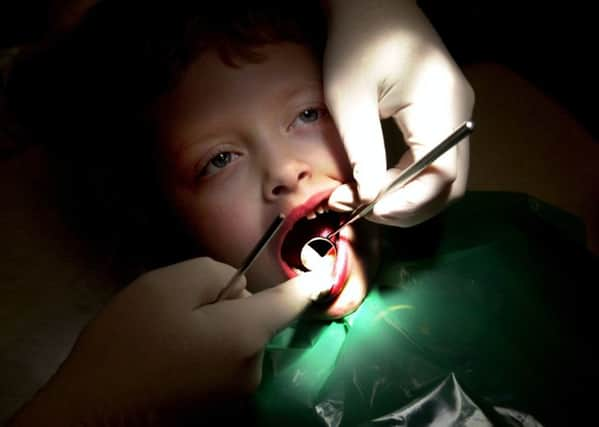Dental health of young Scots lags behind England and Norway


New figures show that 69 per cent of P1 pupils in Scotland have no obvious signs of tooth decay with the national rate up from 41 per cent in 1990.
Despite the rise, Scotland still falls behind England, where 75 per cent of children of a similar age have good dental health, and Norway, where between 73 and 86 per cent of five-year-old’s are decay free.
Advertisement
Hide AdAdvertisement
Hide AdThe British Dental Association (BDA) welcomed the “huge improvement” in dental health since the millennium and said Scotland continued lead the way on early intervention.
Between 2012 and 2015, the Scottish Government spent £35m on its Childsmile programme to provide free toothpaste, toothbrushes and toothbrushing lessons to three and four-year-olds in nursery, and some P1 and P2 pupils.
However Robert Donald, chair of the BDA’s Scotland Dental Practice Committee said rates were still playing “catch up” with those south of the border and warned of an “unacceptable” inequality of dental health between children from the richest and poorest neighbourhoods.
Figures show that 55 per cent of P1 pupils in the most deprived neighbourhoods are decay free compared to 82 per cent who live in the least deprived communities.
Advertisement
Hide AdAdvertisement
Hide AdMr Donald said: “There is no escaping either the fact that far too many children from our most disadvantaged communities still bear the burden of tooth decay, a largely preventable disease.
“Government ministers must continue to invest in Childsmile, to tackle this unacceptable inequality in dental health.
“The BDA has also called on the Scottish Government to expand the Childsmile programme to 5 to 12-year-olds and we have championed wide-ranging action on sugar, including taxation, public education and marketing, and for proceeds from the sugar levy to be directed into oral health initiatives.”
According to figures, P1 pupils in Orkney and Shetland have the healthiest teeth in Scotland of their age group with just over 79 per cent showing no sign of decay.
Advertisement
Hide AdAdvertisement
Hide AdThe figure falls away to 70.1 per cent in Lothian with lower levels of healthy baby teeth recorded in Glasgow (68.2 per cent),Fife (67.2 per cent) and Lanarkshire where the lowest portion of decay-free children was recorded (66.2 percent).
The results come after 15,365 children, around a quarter of the P1 population, had their teeth examined between November 2015 and June 2016,
Dr Colwyn Jones, consultant in dental public health for NHS Health Scotland said Childsmile had been “very successful” and the task was now was to reach out to children who were “more difficult to influence”.
He said poverty remained the single most important barrier to good dental health amongst the young.
Advertisement
Hide AdAdvertisement
Hide AdMr Jones said: “Back in the early 1990s, the amount of tooth decay in Scottish children was pretty high. It was just like every other aspect of health, thing were bad in Scotland at that particular time.
“Childsmile has been a success and prevented decay in large numbers of children.”
He added: “Dental health is improving for everyone, even when equality is not getting better.
“Dental health does not appear to be getting any worse and that is not the same for a lot of childhood illnesses and conditions. We do seem to be holding our own.”
Advertisement
Hide AdAdvertisement
Hide AdHealth Secretary Shona Robison added: “We want to see these positive trends continue and tackle health inequalities in children, and the recently published Fairer Scotland Action Plan has a commitment to extend supervised tooth brushing and fluoride varnish application for nursery and primary 1 and 2 children in deprived communities.”
